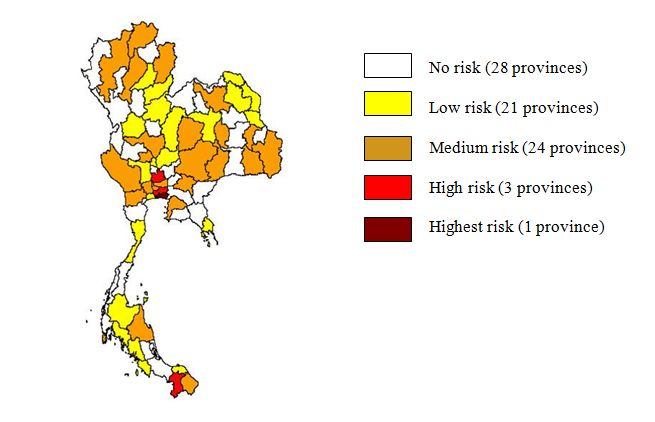The extensive security plan for the upcoming election in Thailand reflects the feeling of insecurity and mistrust, on the one hand, and the degree of electoral contestation, on the other. The recent brutal murder of Bhumjaithai’s key hua khanaen and brother of the party’s Lopburi candidate – Suban Chiraphanwanit [1]– certainly caused panic among some candidates. But the number of election-related incidents will likely be small in comparison to past elections in earlier decades, argues Ajarn Prajak Kongkirati of Thammasat University. [2] Yet, years of unremitting crisis and contestation leaves everyone on edge. The ECT chief admits “this election is the most difficult election for the ECT to date” and warns that many areas are at high risk of election-related violence and must take extra precautions.[3]
Figure 1: Risk ratings by province (as of June 16, 2011). Electoral districts considered at high or highest risks include Bangkok: district 28, Samutprakarn: districts 6&7; Ayuthaya: district 1; Yala: district 2. Source: Internal document of the Police Election Center (obtained by author)
Since 30 May, 352 candidates have requested police protection. Police receive special training to become politicians’ bodyguards and two are dispatched to provide safety for each candidate, with the exception of those in Yala, Narathiwas and Pattani that are given 10 officers each. The change in the vote counting procedure, which will now take place at individual voting units, also causes some worry among the police that the lives of hua khanaen will be at greater risks.[4] Nonetheless, the police reckon the majority of Thailand’s 77 provinces have no risk or medium risk of experiencing election-related violence (Figure 1).
To show that they’re taking the election seriously, the police have beefed up security in the red zones and begun hunting down the 75 Most Wanted Gunmen for Hire (dead or alive).[5] During the first phase of the crackdown, the police made 1,752 arrests, and confiscated 41 guns, 411 bullets and some 40,000 amphetamines.[6] The second round of the security “clean-up” saw an additional 1,277 arrests as well as confiscation of thousands more guns, 21 bombs and 12 artillery units.[7] On Election Day, some 100,000 police officers will be stationned at 94,000 voting units across the country to ensure safety and deter any electoral wrongdoing.
But perhaps security is not the only major concern in this election. The “legitimacy” of the various institutions involved is also at stake. UDD’s acting chair – Thida Thavornseth – has sought the ECT’s permission to allow Red Shirt observers at each voting unit with their tape recorders and cameras.[8] Although Suthep Thuagsuban has vehemently opposed the presence of international observers in Thai election, stating “I don’t respect farangs, we do not have to surrender to them,”[9] the ECT has granted permission for ANFREL to act as foreign election observers and is considering allowing EU officials. Other NGOs, such as the P-Net and Thai Election Watch, have pushed for greater public participation in the election monitoring process by encouraging voters to report on electoral misconduct.
Both the police and the ECT, it seems, are doing their best to ensure a free and fair election. Unfortunately, General Prayuth’s televised speech is undermining the sanctity and legitimacy of this election. There is a Thai saying “р╕бр╕╖р╕нр╣Др╕бр╣Ир╕Юр╕▓р╕вр╣Ар╕нр╕▓р╣Ар╕Чр╣Йр╕▓р╕гр╕▓р╕Щр╣Йр╕│” (a person who doesn’t help but only hinders progress).
[1] For more detail on the murder, see Bangkok Post, June 17, 2011. http://www.bangkokpost.com/news/politics/242614/bhumjaithai-canvasser-shot-dead
[2] For more detail on Ajarn Prajak’s talk: http://www.prachatai3.info/journal/2011/06/35447
[5] For a list of gunmen, see http://electioncenter.police.go.th
[7] Krung Thep Turakij June 14, 2011
[8] Bangkok Post June 1, 2011. http://www2.bangkokpost.com/news/local/240059/udd-wants-to-observe-election
[9] Bangkok Pundit May 24, 2011. http://asiancorrespondent.com/51084/thailand-rejects-foreign-election-observers/
 Facebook
Facebook  Twitter
Twitter  Soundcloud
Soundcloud  Youtube
Youtube  Rss
Rss 
